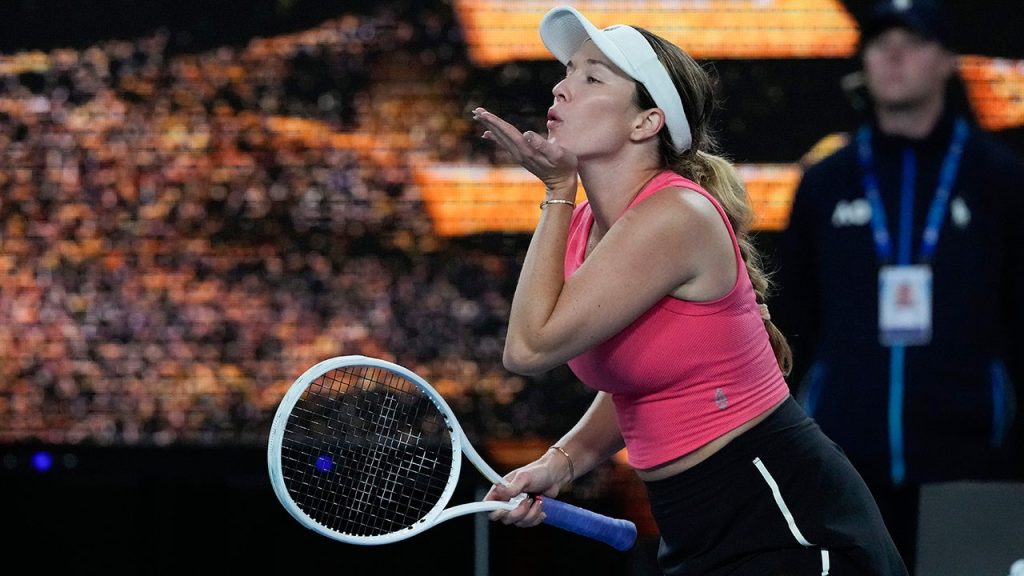Danielle Collins, the American tennis professional who reached the finals of the 2022 Australian Open, found herself embroiled in a contentious relationship with the Australian crowd during her second-round match against local favorite Destanee Aiava. Collins’ victory, a hard-fought 7-6(4), 4-6, 6-2 affair spanning nearly two and a half hours, was met with a chorus of boos and disapproval from the home crowd, a reaction that seemed to fuel Collins’ competitive fire. Unfazed by the negative reception, Collins responded with provocative gestures, blowing kisses to the crowd and seemingly egging them on after securing the match point. This audacious display set the stage for a post-match interview and press conference laden with pointed remarks about her detractors.
In her on-court interview immediately following the victory, Collins addressed the hostile crowd head-on, attributing her motivation to their disapproval. She expressed a sense of satisfaction in knowing that even those who disliked her were contributing to her earnings. “It’s a pretty amazing feeling as an athlete because the people that dislike you or hate you pay your bills,” she remarked, highlighting the financial rewards derived from their attendance. Collins continued this theme by thanking Australia for the “paycheck,” a statement that undoubtedly further agitated the already disgruntled crowd.
During her subsequent press conference, Collins doubled down on her earlier comments, reiterating that the crowd’s “energy,” whether positive or negative, serves as a driving force for her performance. She elaborated on her earlier remarks about her critics “paying her bills,” explaining that every ticket purchased, even by those intending to heckle her, contributes to her financial well-being. This perspective, she asserted, empowers her to embrace the negativity and channel it into motivation. Collins presented this concept as a “cool” aspect of professional athletics, framing the animosity as an indirect form of support for her career.
Collins’ candid and somewhat defiant comments sparked considerable debate regarding the relationship between athletes and their fans, particularly in the context of home-crowd advantage and the pressures faced by visiting players. While some viewed her remarks as insensitive and disrespectful to the Australian fans, others interpreted them as a reflection of the mental fortitude required to perform at the highest level of professional sport, especially when facing a hostile environment. Collins’ response can be seen as a testament to the psychological resilience needed to compartmentalize external pressures and focus on the task at hand. Her ability to reframe the negativity as a source of motivation, rather than a detriment, underscores the complex mental game often at play in professional tennis.
Furthermore, Collins’ comments shed light on the financial realities of professional tennis, where player earnings are often directly linked to tournament performance and attendance. By emphasizing the financial contribution of even her detractors, Collins highlighted the economic ecosystem surrounding professional sports. This candid discussion of the financial aspect of her profession, while perhaps unconventional, added another layer to the ongoing discourse about the relationship between athletes, fans, and the business of sport. Her subsequent remarks about using her earnings for lavish vacations further underscored this point, albeit with a touch of playful extravagance.
Collins’ unapologetic attitude and willingness to engage with the crowd’s negativity, while potentially polarizing, exemplifies the mental toughness and self-assuredness that often characterize successful athletes. Her ability to transform the crowd’s disapproval into fuel for her performance underscores the psychological strategies employed by elite athletes to navigate high-pressure situations. Whether her approach is deemed appropriate or not, it undeniably sparked conversation and offered a glimpse into the mental game played both on and off the court in the world of professional tennis. The incident also highlights the delicate balance between athletes engaging with their fans and the potential for such interactions to escalate into contentious exchanges. Ultimately, Collins’ response to the Australian crowd became a talking point of the tournament, raising questions about sportsmanship, fan behavior, and the pressures faced by athletes competing on the global stage.

